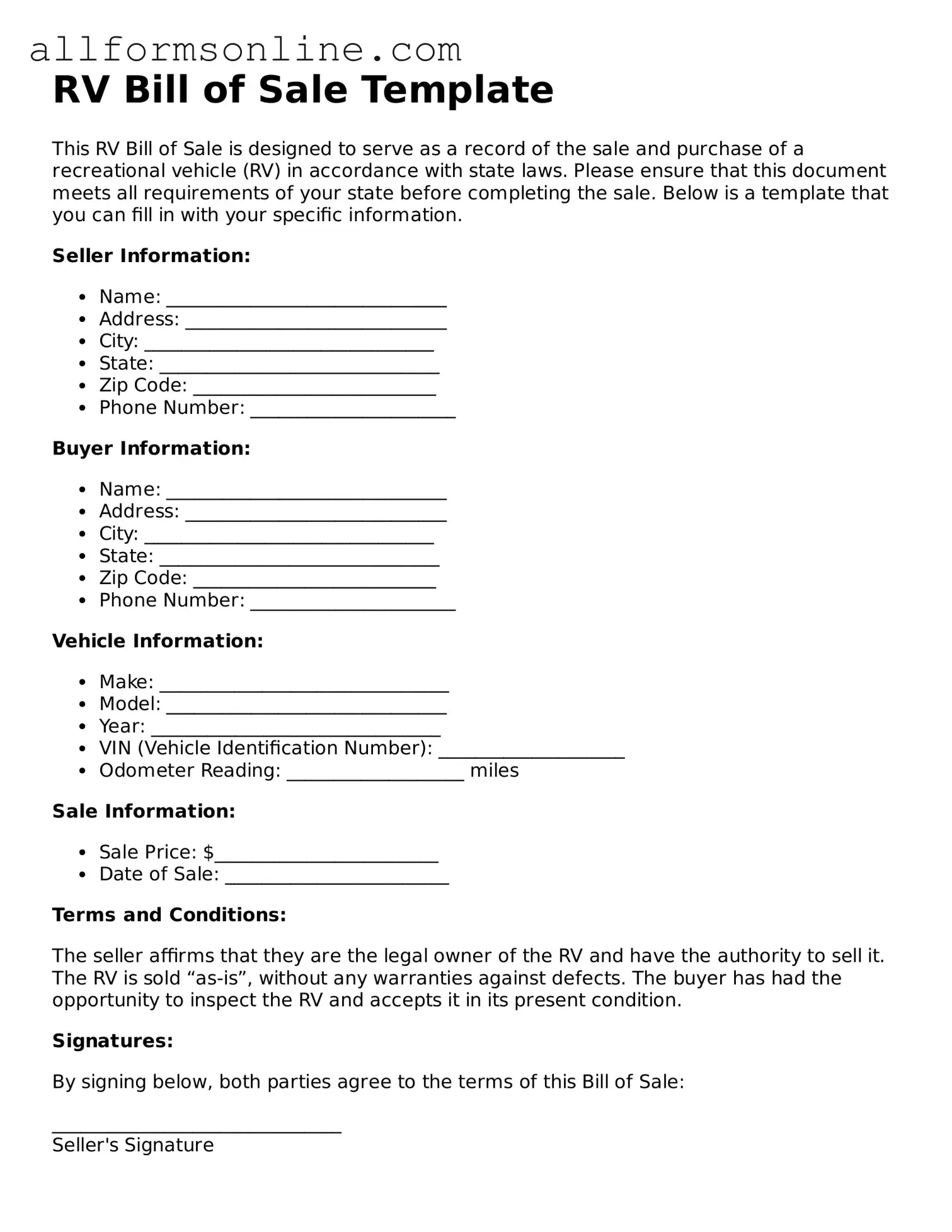Blank RV Bill of Sale Form
RV Bill of SaleDocuments for Particular States
Misconceptions
When it comes to buying or selling a recreational vehicle (RV), the RV Bill of Sale form plays a crucial role. However, several misconceptions can cloud the understanding of its purpose and importance. Here are four common misconceptions:
- It’s Just a Simple Receipt: Many people believe that an RV Bill of Sale is merely a receipt for the transaction. In reality, it serves as a legal document that outlines the details of the sale, including the parties involved, the vehicle's condition, and any warranties or guarantees. This document can protect both the buyer and seller in case of disputes.
- It’s Not Necessary for Private Sales: Some individuals think that a Bill of Sale is only required for transactions conducted through dealerships. However, even private sales benefit from having this document. It provides proof of ownership transfer and can be crucial for registering the RV in the new owner's name.
- Only the Seller Needs to Sign: There is a common belief that only the seller's signature is necessary on the Bill of Sale. In fact, both the buyer and seller should sign the document. This mutual agreement solidifies the terms of the sale and confirms that both parties acknowledge the transaction.
- It Doesn’t Affect Taxes: Many people assume that the Bill of Sale has no impact on taxes. This is misleading. In many states, the information on the Bill of Sale is used to determine sales tax obligations. Therefore, it is important to ensure that the document accurately reflects the sale price and other relevant details.
Understanding these misconceptions can help ensure a smoother transaction process when dealing with RV sales. Clarity and accuracy in documentation can prevent future complications and provide peace of mind for both buyers and sellers.
What to Know About This Form
What is an RV Bill of Sale?
An RV Bill of Sale is a legal document that records the transfer of ownership of a recreational vehicle (RV) from one party to another. This form serves as proof of the transaction and includes important details such as the names and addresses of both the buyer and seller, the vehicle's identification number (VIN), make, model, year, and sale price. Having this document is crucial for both parties, as it protects their rights and helps in future registrations and title transfers.
Why is it important to have an RV Bill of Sale?
Having an RV Bill of Sale is essential for several reasons. Firstly, it provides legal evidence of the transaction, which can be vital if disputes arise in the future. Secondly, it helps establish the new owner's rights to the RV, making it easier to register the vehicle in their name. Additionally, some states may require this document for tax purposes or to complete the title transfer process. In short, it safeguards both the buyer and seller, ensuring a smooth transition of ownership.
What information should be included in the RV Bill of Sale?
To ensure the RV Bill of Sale is comprehensive, it should include specific details. Key information includes the full names and addresses of both the buyer and seller, the RV's make, model, year, and VIN, as well as the sale price. It's also wise to note the date of the transaction and any conditions of the sale, such as whether the RV is sold "as-is" or if any warranties are provided. Including this information helps prevent misunderstandings and clarifies the terms of the sale.
Do I need to have the RV Bill of Sale notarized?
Not all states require an RV Bill of Sale to be notarized, but having it notarized can add an extra layer of security and legitimacy to the document. Notarization verifies the identities of both parties and confirms that they willingly entered into the agreement. If you are unsure about your state's requirements, it's a good idea to check with local authorities or consult with a legal expert. Taking this step can help ensure that your transaction is recognized and enforceable.
Popular RV Bill of Sale Types:
California Bill of Sale Pdf - May help validate the sale in case of legal inquiries later on.
To ensure a smooth application process for Disability Insurance benefits in California, it is important to have access to reliable resources for filling out the EDD DE 2501 form. Utilizing services like Fast PDF Templates can provide convenient templates that simplify the process and help applicants avoid any mistakes that could delay their benefits.
Bill of Sale for Trailer in Texas - Records the transfer of trailer ownership between parties.
How to Use RV Bill of Sale
After gathering the necessary information, you will be ready to complete the RV Bill of Sale form. This document serves as a record of the transaction between the buyer and the seller. Once filled out, both parties should retain a copy for their records.
- Begin by entering the date of the sale at the top of the form.
- Provide the full name and address of the seller in the designated section.
- Next, fill in the buyer's full name and address.
- Include details about the RV, such as the make, model, year, and Vehicle Identification Number (VIN).
- Specify the sale price of the RV clearly.
- Indicate the method of payment, whether it’s cash, check, or another form.
- Both the seller and buyer should sign and date the form at the bottom.
- Make copies of the completed form for both parties to keep.
